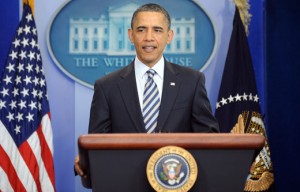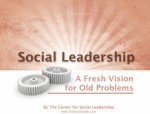President Obama in 2012: What to Expect by Oliver DeMille
Published: Tue, 07/03/12
 "Empowering Ordinary Citizens to Make an Extraordinary Difference"
|
|
President Obama in 2012
What to Expect
Three Ways Takes to Current EventsOne way to understand current events is
 to
take a long view of the major historical trends at play, and another is
to clearly define the systemic forces that influence what is going on. to
take a long view of the major historical trends at play, and another is
to clearly define the systemic forces that influence what is going on.A third is to learn about the character of the leaders who shape policy and especially those who have the power to make decisions that change society. This third method may be the least accurate at predicting the years ahead, but it is often the most interesting of the three. David Maraniss has helped Americans understand the character of our current President in his new book, Barack Obama: The Story. Maraniss is a Pulitzer Prize-winning biographer, and he tells us several key traits that help us understand our top executive. For example, according to Maraniss, Barack Obama is loathe to take risks until he has thought through every detail. As a result, he avoids taking many risks, but often ends up taking a big risk when time runs out and he must act. Thus his presidency has consisted of few singles or doubles, to use a baseball analogy, but a few well-placed home runs such as passing health care and executing Osama bin Laden. This methodology gives his critics evidence of a president lacking in consistent leadership and bungling too many things as the months pass, and it provides his supporters with a list of significant successes that only a truly top achiever could attain. Thus the critics brush away his home runs as anomalies, while his
supporters see the months where little is accomplished as prelude to
great strokes of leadership.
"Out of Touch" is Actually Strategic TimingAnother trait exemplified by the President is that he deals with
problems at his own pace rather than being swept by what is current or
pressing.
At any given time, the weekly talk shows and nightly news emphasize a set of given concerns or a hot topic. Barack Obama seldom follows the news cycle in his thinking, however, which leads critics to say he is out of touch and at the same time leaves supporters wondering what their leader is doing--until he surprises everyone. Such surprises have come at seemingly strange times through the Obama presidency. The President, Maraniss suggests, is often focused on an issue that the media has written off as finished, old news, until the President takes action. Many thought the health care issue was over and lost in the fall of 2009, but the President surprised Washington and the nation in the spring of 2010 by reintroducing it at a time that it could pass. Likewise, most Americans thought the hunt for bin Laden was basically over until the President announced that he had been killed. Most Americans assumed the immigration debate would drag on for years, yet in one announcement the President ended deportation of millions of immigrants who came to the U.S. as children. Again, this is Barack Obama's modus operandi: let things seemingly dwindle away, then strike when the odds of success are high and the opposition isn't expecting anything. By the time Republicans gear up to a full response, the President is on to another agenda. And There's MoreThis is more than an isolated tactic. One by one, he has reached out
with surprise announcements that supported gay rights, immigrants, women
(the "war" on women), environmental groups (Keystone pipeline),
minorities, Occupy Wall Street, and so on.
The announcements have been largely rhetorical, but in each case Obama's opponents have vocally responded in ways that pushed people in these constituencies firmly into the Obama camp. The Republicans have done nothing to counter any of this, at least not in ways that energize the important swing voters. Whatever your political views--however much you like or dislike President Obama's policies--he is a brilliant politician. If you are an Obama supporter, this is seen as high leadership. Critics see it as manipulative and a little bit Machiavellian. But nobody who is closely following the facts denies that it is effective. Regarding the 2012 presidential election, those who feel that Obama's failures in the last three years and his administration's inability to turn around the economy spell sure defeat on election day would do well to rethink their position. As much as some of his opponents want to paint him as a bungling do-gooder who is "in over his head," the record shows a pragmatic and shrewd politician. The American electorate may be fed up with the economy to the point that they'll vote for change in November, but don't count out Barack Obama until the last votes are tallied. Strengths and Weaknesses--ObamaEvery president has certain strengths, and Obama's include timing and surprise.
Moreover, while most conservatives will vote for Romney and most progressives for Obama, the election will almost certainly be decided by independents in battleground states (Pennsylvania, Colorado, Iowa, Ohio, Wisconsin, Nevada, and Florida)--swing voters who care more about leadership potential than ideology or policy. And let's be clear, good instincts on timing and the ability to effectively use surprise are interpreted by many swing voters as strong indications of leadership ability. If Obama has a glaring weakness, it may be his reticence in admitting mistakes or taking responsibility when his administration miscalculates or fails. Again, while his supporters forgive this as a simple human flaw and
critics attempt to blow it out of proportion, many swing voters see this
as strength of conviction.
What Swing Voters Do and Do Not Know |
Connect & Engage
Recent Blog Articles
By Stephen Palmer
By Oliver DeMille
By Bryan Hyde
By Oliver DeMille By Chris Brady
By Orrin Woodward
By Stephen Palmer Free PDF Downloads
|
www.TheSocialLeader.com |




